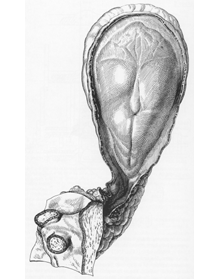The Stages of Human Embryonic Development
Stage 8 embryos are characterized by the appearance the neural groove; a notochordal canal, and gastrulation (primitive) node and pit are also typically present. The embryonic disc can vary considerably in shape and size, it can be ovoid, circular or pyriform. Ovoid embryos can have their greatest diameter along either the rostral-caudal or transverse axis while pyriform discs taper caudally. The embryos are still in the presomite period although the embryonic discs are completely trilaminar with mesoblastic cells extending to the edges and joining with extra-embryonic mesoblast. Stage 8 embryos have a maximum chorionic diameter of between 9 - 15 mm and an embryonic disc greatest diameter of 0.5 to 2 mm. They have an estimated postfertilization age of 23 days.
| Browse the section images |
| 3D reconstructions |
| More info ... |
